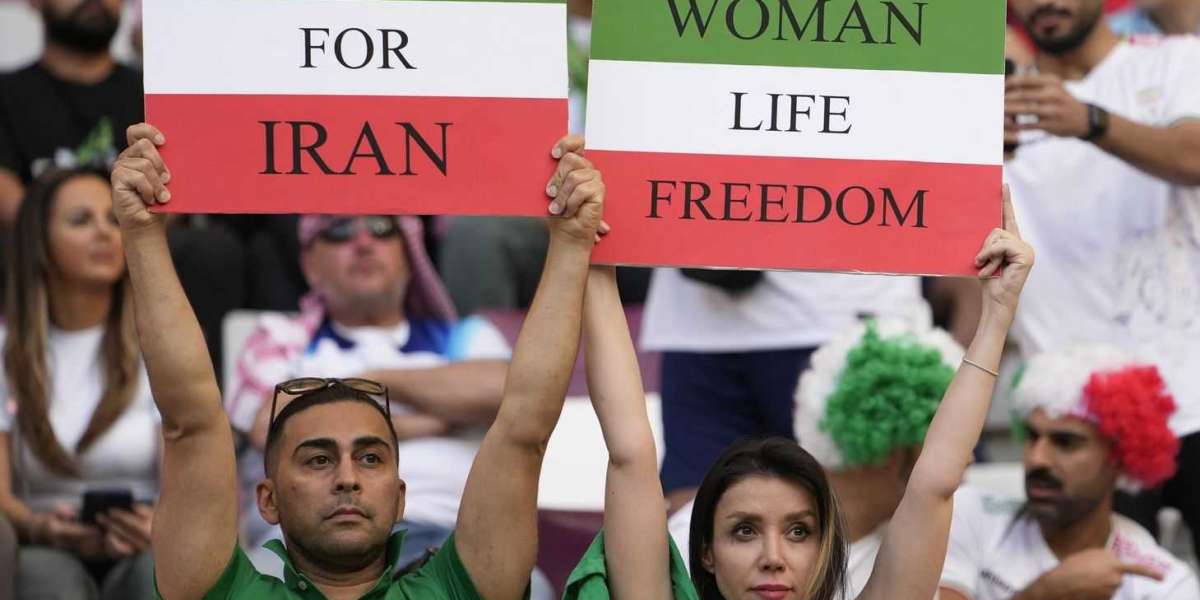People in Iran demand equality and freedom because they have been subjected to unfair treatment for a long time and there have been a lot of conflicts within society. Examples of this include farmers protesting a lack of water for agriculture, students protesting a lack of academic freedom, teachers protesting a lack of wages, and pensioners protesting a lack of pension benefits. The recent protests are likely to be a result of these grievances as well as the death of Mahsa Amini, a 22-year-old Iranian Kurdish woman who died while in the custody of the morality police for wearing a headscarf in the wrong way.

The people of Iran united more to protest against the clerics.
Since its establishment more than four centuries ago, Iran's ruling clergy system has been rocked by protests. In 1999, students took to the streets to oppose the closure of a moderate newspaper. In 2009, Mahmoud Ahmadinejad became president through an election tainted with allegations of fraud, fanning the flames of the middle-class protest movement. In 2017 and 2019, rising fuel and bread prices led to protests by the impoverished. Previous uprisings were divided along class lines. Now, Iranians are uniting under the banner of "Equality for Women, Freedom for All."
According to some analysts, the current women's movement in Iran is an effort to reclaim their rights, equality, and freedom, similar to the Arab Spring, which began with the self-immolation of Mohamed Bouazizi, a fruit vendor in Tunisia. The protesters in Iran today are not only calling for reform but also for a change in the ruling clergy system. They hope that the leaders should be trained in public administration, coming from a variety of economic and social backgrounds, rather than purely clerical figures who only understand fundamentalist doctrine.
Grand Ayatollah Ali Khamenei, Iran's supreme leader, dismissed the protesters' calls, claiming they were foreign plots orchestrated by the US and the Israeli regime.In response to the protests, the Iranian government quickly shut down social media platforms to prevent coordination between people and arrest leaders. The protests gradually subsided. However, they were still raging in many places, causing the government and Iranian security forces to be confused. There were indications that the Revolutionary Guards did not want to or reluctantly followed orders from the clergy to suppress the movement in some places.
In recent times, opposition to the ruling clergy has moved into a new phase. Many young people in Iran have raised their voices, and their organization has become more structured. They believe that a successful revolution must have people with a real revolutionary spirit. Groups like "Youth of Tehran" have risen up and called for more protests. The call was partially successful. The opposition also held demonstrations in many provinces and closed markets and businesses to show solidarity with the gender equality movement. Although the clergy still want to clamp down hard, recent events have shown that security forces and the military prefer to prioritize dialogue.
Recent protests in Iran have divided gender lines and are seen as a necessary condition for reform, leading to greater gender equality for women. Supreme Leader Khamenei has expressed worry that much of the elite may be straying from traditional Islamic values.
Former parliamentary speaker Ali Larijani said, "We must provide public spaces for people to protest and ensure their security so that they can voice their opinions and engage in dialogue." Former President Mohammad Khatami commented: "Discriminating against women has caused our country to lose a great many talented people, leading to a weakened state and exacerbating the current social issues."
The Islamic Republic, a paper founded by high-ranking clergy, also candidly commented in a recent article: "Poverty, unemployment, oppression, and environmental devastation have caused people, including students, teachers, and retired officials, to stand up and resist." Gender inequality has been around for a long time. "The people are not enemies of the government; they just want reform to help the country overcome its hardships."
A University of Tehran professor who went to the streets with the anonymous students said: "We cannot restrict academic freedom in education." Education encompasses far more than we realize.Education is not only about the teachings of religion or any political ideology. Education is about emancipation, guiding people to be competent in their professions, emotionally strong, to live with morality and compassion, and to embrace each other. Therefore, we oppose the theories of some clergy who support discrimination between one and the other.
According to some experts, in this crisis, the reactions of the clergy are somewhat conflicting. The Supreme Leader, Khamenei, has been in power for many years, largely spending it denouncing people who have different opinions. As a result, those closest to the highest leadership are mostly obedient and untalented.President Ebrahim Raisi comes from the judicial sector; his political career has been mainly in court, so he has no social experience, especially in dealing with the country's complex issues.
The Justice Minister, Mohseni Ejei, was wavering, wanting to call for dialogue while issuing threats and cracking down on protests.
Iran's intelligence agency, run by clerics, failed to gauge the scope of the protests. Worse, the hundreds of people killed in the protests and the government's start of a crackdown on some of the leaders are pushing the people further away from the clerics. While the protesters have no agenda and no signs that they are willing to die for their faith, the recent events suggest that the clerics are facing an existential crisis.
External pressure on teachers
For many years, Iran has been eager to cooperate not only with the West regarding its nuclear weapons program but also with its regional neighbors, especially Saudi Arabia and Israel. These countries have sought to slow Iran's progress toward uranium enrichment, which could lead to the production of nuclear weapons. One of the measures has been to push for reform from within. However, in recent times, the West has not shied away from openly expressing the desire for an Iranian revolution similar to the Islamic Revolution of 1979.
From the perspective of many hardline Western activists, the US should declare that it will end talks with Iran on the 2015 nuclear deal, an agreement that would prevent Iran from producing nuclear weapons in exchange for lifting sanctions. The US should also make it clear that they will not negotiate with the clerics who are oppressing their people and causing unrest in neighboring countries. Such declarations would deprive the Iranian government of the ability to create hope among their people that sanctions could be lifted through negotiations.
By publicly closing negotiations and helping the West exercise more leverage on Iran through economic sanctions, the US should direct its targets to the most egregious human rights violators in Iran, reinforcing the public's hope for government accountability. This should be accompanied by strong and consistent statements of support for the protesters.
The US also needs to remove surveillance and facilitate information sharing among protesters. Sending Starlink end-devices, as proposed by billionaire Elon Musk, could help such efforts by allowing the opposition to avoid surveillance and gain access to social media networks.Other software applications, such as Ushahidi, used to monitor elections around the Sahel region, also allow voters to share pictures of polling sites. Such applications could be reused, allowing Iranians to share pictures of protests in different parts of the country, allow coordination among protest groups, and force authorities to increase security personnel.
US should also leverage popular social media channels, such as Telegram, in order to provide dissidents with accurate information on what is happening across the country, including protests, human rights violations, and crackdowns. Expanding and creatively using such channels can help Iranian leaders support their people more and counter hardline clerics.
According to The New York Times, in December 2022, oil and steel workers had stopped working in solidarity with protesters in Iran's largest uprising in decades. Washington should support such actions and help union activists communicate with each other. The US aid to the Solidarity movement in Poland in the 1980s helped drive the collapse of the Soviet bloc. A parallel effort in Iran today could contribute to the reform of the clergy.
The difficulty of the West in pressuring the priests
Since the outbreak of protests, a number of Western countries, such as the US, Australia, the UK, and Canada, have imposed additional economic sanctions on Iran. This is putting a lot of pressure on the clergy. However, it is also creating difficulties for the West in many ways.
In the meantime, due to the Western siege, Iran has strengthened cooperation with Russia in all aspects, especially energy and oil. High-level delegations from the two sides have been visiting each other. Iran wants Russia to help build oil pipelines, coal-fired power plants, and liquefied gas plants. Both have populations of over 100 million people. This is a huge market that one side can take advantage of. Iran needs grain and agricultural products from Russia. Russia needs a market to consume. In addition, Russia needs many other products from Iran, such as machinery parts. Iran and Russia are said to be close to concluding a free trade agreement. If Iran joins, the free trade zone, which includes Russia, Belarus, Kyrgyzstan, and some other former Soviet countries, is expected to become much stronger.
Western countries are particularly concerned about a partnership between Iran and Russia regarding military security. Iran has provided Russia with unmanned aerial vehicles, components for the production of unmanned aerial vehicles, and production lines for unmanned aerial vehicles. In addition, Iran has the potential to provide short-range missiles to Russia. In return, Russia may provide Iran with fifth-generation aircraft such as the SU-35 as well as other modern military equipment. Moreover, Russia may also help Iran cope with protest waves, such as by sharing experience or providing equipment to security forces. Clearly, this is a scenario that the West does not want. For example, if Iran provides Russia with short-range missiles, it is likely that the conflict zone in Ukraine will change.
In addition, the West's deep intervention in Iran's internal affairs has alarmed many other Asian countries. Despite the fact that the ruling clerics have many controversial policies and are unpopular among the people, it is still an intervention into the internal affairs of a sovereign nation. Countries that are hostile to the West's human rights issues, particularly China, are wary of this. When this becomes more serious, as in recent times, it hinders much multilateral cooperation, especially in areas that bring global benefits, such as mitigating climate change. This is not what Washington wants, as it has always been at the forefront of efforts to prevent the earth from heating up.
The increased pressure on Iranian clerics has also led to another risk, namely that the Islamic Republic is pushing forward its nuclear program because it feels endangered. This is a situation similar to that in North Korea. North Korea is determined to produce nuclear weapons with an unyielding mentality because it always feels threatened. The survival of the regime is at stake. Similarly, if Iran's nuclear and missile programs make great progress, the situation in the Middle East will become increasingly complex. Iranian proxies in Lebanon, Syria, Palestine, or Yemen will become more active. For example, in Yemen, the Saudi-led coalition has been unable to defeat the Houthis. The Houthis even use Iran-supplied drones and missiles to attack the capital, Riyadh.

Conclusion
It can be said that never before have the people of Iran united to demand equal rights for men and women and strong social equality as they have in the past few months. To this point, the power of the clergy remains strong and shows no signs of being threatened. However, there are signs that the clergy has begun to accept some more progressive changes, however small. For example, they have not opposed, or only mildly opposed, when some female Iranian athletes have competed without a headscarf. They have also relaxed their moral policing, which has focused on arresting women who do not dress according to Islamic rules. From this, Iranians can hope for a future with more breathing room and progress.





James Wood 1 Y
Contact us for Medication management services
https://www.brightpoint-md.com/medication-management-services/